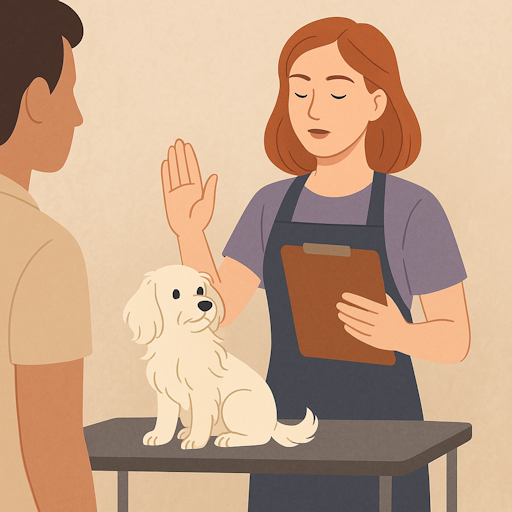🚫 Should You Say Yes to Every Request? Learning to Say No to Protect Your Business
- Nathalie Ariey-Jouglard

- Jul 24, 2025
- 2 min read

In the early stages of running a business, we often fear saying no.Fear of losing a client. Fear of damaging our reputation. Fear of missing an opportunity.
But the truth is…
Saying no at the right moment is an act of protection.
For yourself, for your business — and sometimes even for the animal.
Here’s why you don’t have to say yes to everything — and how to say no with confidence and professionalism.
🧨 1. Some requests threaten your balance
“Can I come at 9 p.m.?”“Can you take my big matted dog right before closing?”“I don’t have the budget — could you make a little exception?”
👉 When you say yes to everything, you burn out.
And when you’re drained, you can’t deliver the quality of service you’re proud of.
Saying no protects your time, energy, and love for your craft.
🐕🦺 2. Some animals pose a real risk
A dog that bites, a very elderly or anxious animal, or a cat unused to handling…These cases require expertise, time, and sometimes special equipment.
👉 If you’re not trained or don’t feel safe, you have the right — and the responsibility — to decline.
Saying no is not failure.It’s a sign of professional maturity.
❌ 3. Saying no isn’t rude — it’s setting boundaries
Saying no with kindness and clarity means saying yes to:
respectful client relationships,
clear boundaries,
quality service,
and a sustainable business.
You can say:
“I understand your request, but I won’t be able to meet your expectations under the right conditions.”
Or:
“This service isn’t part of what I offer, but I’d be happy to refer you to a qualified colleague.”
🧠 4. Saying yes to everything damages your brand image
A client who pushes your limits, wants everything last minute or at a discount, won’t truly respect your work.
They’ll see you as someone who’s always available, at any cost.
And that weakens your positioning, authority, and credibility.
👉 Setting limits shows that you’re a pro who knows their value —And that’s exactly what great clients are looking for.
✨ In short
Saying no means:
choosing the right clients,
protecting your health,
ensuring animal safety,
respecting your profession.
It’s not rejection.
It’s an affirmation.
Of your limits, your standards, your vision.
💬 And you? When did you learn to say no? Did it change your well-being or your clientele? Share your story 👇




Comments